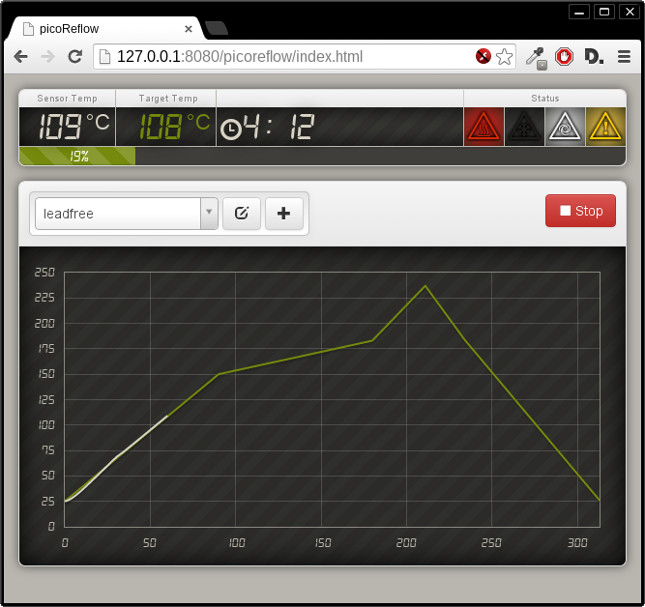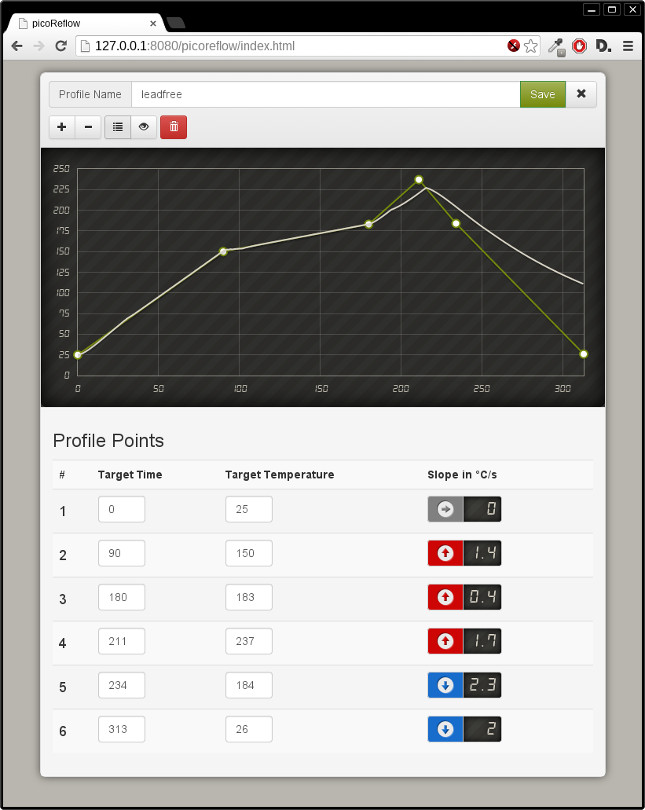|
|
||
|---|---|---|
| lib | ||
| public | ||
| storage/profiles | ||
| .gitignore | ||
| README.md | ||
| config.py | ||
| config.py.EXAMPLE | ||
| kiln-controller.py | ||
| requirements.txt | ||
| start-on-boot | ||
README.md
Kiln Controller
Turns a Raspberry Pi into a cheap, web-enabled kiln controller.
Features
- easy to install and run on most Raspberry Pi versions
- easy to create new kiln schedules and edit / modify existing schedules
- no limit to runtime - fire for days if you want
- view status from multiple devices at once - computer, tablet etc
- firing cost estimate
- NIST-linearized conversion for accurate K type thermocouple readings
- supports PID parameters you tune to your kiln
Standard Interface
Curve Editor
Hardware
- Raspberry Pi
- MAX 31855/6675 Cold-Junction K-Type Thermocouple
- GPIO driven Solid-State-Relay
Installation
Raspbian
Download NOOBs. Copy files to an SD card. Install raspian on RPi using NOOBs.
$ sudo apt-get install python-pip python-dev libevent-dev python-virtualenv
$ git clone https://github.com/jbruce12000/kiln-controller.git
$ cd kiln-controller
$ virtualenv venv
$ source venv/bin/activate
$ pip install greenlet bottle gevent gevent-websocket
Note: the above steps work on ubuntu if you prefer
Raspberry PI deployment
If you want to deploy the code on a PI for production:
$ cd kiln-controller
$ virtualenv venv
$ source venv/bin/activate
$ pip install RPi.GPIO
If you also want to use the in-kernel SPI drivers with a MAX31855 sensor:
$ pip install Adafruit-MAX31855
Configuration
All parameters are defined in config.py, just copy the example and review/change to your mind's content.
$ cp config.py.EXAMPLE config.py
Usage
Server Startup
$ ./kiln-controller.py
Autostart Server onBoot
If you want the server to autostart on boot, run the following commands
$ /home/pi/kiln-controller/start-on-boot
Client Access
Open Browser and goto http://127.0.0.1:8080 (for local development) or the IP of your PI and the port defined in config.py (default 8080).
Simulation
Select a profile and click Start. If you do not have a raspberry pi connected and configured, or if you don't install the Adafruit-MAX31855 library, then your run will be simulated. Simulations run at near real time and kiln characteristics are defined in config.py.
License
This program is free software: you can redistribute it and/or modify it under the terms of the GNU General Public License as published by the Free Software Foundation, either version 3 of the License, or (at your option) any later version.
This program is distributed in the hope that it will be useful, but WITHOUT ANY WARRANTY; without even the implied warranty of MERCHANTABILITY or FITNESS FOR A PARTICULAR PURPOSE. See the GNU General Public License for more details.
You should have received a copy of the GNU General Public License along with this program. If not, see http://www.gnu.org/licenses/.
Support & Contact
Please use the issue tracker for project related issues.
More info: https://apollo.open-resource.org/mission:resources:picoreflow

